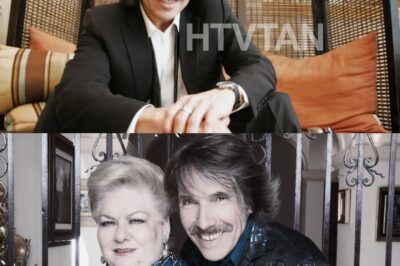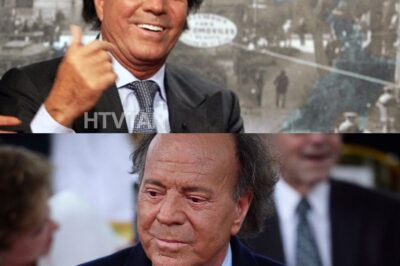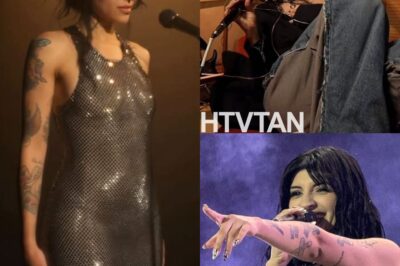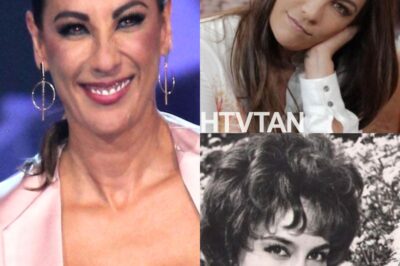¡LA POLÉMICA ENTRE BRONCANO Y MELODY ALCANZA SU PUNTO ÁLGIDO EN ‘LA REVUELTA’! 😱 ¿Qué Dijo Broncano Tras el Desplante y las Acusaciones de la Cantante? 🎤 #BroncanoEnFuria
El choque entre Broncano y Melody sigue siendo tema de conversación. Tras un desplante por parte de la cantante, Broncano no se quedó callado y ofreció su respuesta en La Revuelta, con una sinceridad que sorprendió a todos. ¿Cómo se desarrolló este tenso enfrentamiento y qué más tiene que decir el presentador sobre el asunto? La tensión está al máximo, y las reacciones siguen llegando. No te pierdas el análisis completo de esta histórica disputa. 👇👇
😨🥵 ¿Quieres saber cómo se desarrolló este momento intenso e innovador? ¡Haz clic a continuación para leer todos los detalles impactantes del encuentro que ha causado revuelo en el mundo de los medios! 👇👇
Melody Criticizes La Revuelta for Mocking Her Break, David Broncano Responds with Humor and Irony
David Broncano couldn’t believe his ears. The start of La Revuelta on Monday was interrupted by an unexpected piece of news: Melody had spoken out about the show, and not in a positive way. “Has Melody really gotten mad at us?” the host asked, caught off guard and visibly unaware of the brewing tension at Prado del Rey.
The situation stemmed from Melody’s sudden decision to cancel her appearance on La Revuelta just after the Eurovision Song Contest, a move that had caught both the producers and the public by surprise. As the story unfolded, it was revealed that the cancellation was related to her need to recover after the emotional and physical strain of the contest. However, the cancellation led to some unsavory comments on the show, where Broncano and his co-hosts humorously remarked on her absence, making light of her decision to retreat and rest. “She got upset, went straight home, and closed the blinds… we wish her emotional recalibration,” they joked, unknowingly fueling the singer’s frustration.
Melody’s Reaction: A Stand for Mental Health
It didn’t take long for Melody to respond. In a press conference held that same Monday, Melody criticized the show, though she refrained from directly naming La Revuelta or David Broncano’s program. Nevertheless, she voiced her frustration, pointing out the hypocrisy of media outlets that discuss the importance of mental health while ridiculing someone for seeking rest. “I don’t like the double standard of talking about mental health and then laughing at someone who asks for a break,” she said, her expression serious and resolute.
In her remarks, Melody made it clear that her decision to cancel the interview wasn’t out of malice or to stir controversy. Instead, it was about her need for recovery, something she felt should be respected. The singer, who had been under immense pressure following her performance in the Eurovision Song Contest, was adamant that her actions were not meant to provoke but rather to take care of her well-being after a grueling international competition.
Broncano’s Response: A Mixture of Irony and Diplomacy
David Broncano, who had yet to hear Melody’s public remarks when the show aired, took the news in stride, opting to respond with humor. His reaction was typical of his on-screen persona: ironic and light-hearted. “I really like Melody. We’ve invited her on the show a million times. If she’s cited me, I’ll say something tomorrow. I’ll do what I usually do on national TV: get informed and answer tomorrow,” he remarked with his signature wit.
His co-hosts, Grison and Ricardo Castella, also joined in the banter, subtly hinting at Melody’s comments with humor. “She says she’s sorry,” Castella commented, attempting to keep the mood light. Miguel Campos, another of Broncano’s colleagues, presented a humorous touch by holding up an image of “San Fadao, Patron of the Offended,” poking fun at the growing trend of public figures and social media users getting upset over seemingly trivial matters. The light-hearted response from the La Revuelta team didn’t end the conversation, but it certainly added a layer of irony to the growing public spat.
Broncano wrapped up the situation, at least for the moment, by taking a diplomatic approach: “I’ll take a look at it and say something tomorrow.” This decision was likely an attempt to keep the peace while allowing time for cooler heads to prevail, as well as to avoid escalating the conflict further.
Melody’s Determined Stand
Despite the playful jabs from Broncano and his team, Melody refused to stay silent. During her press conference, she took the opportunity to clarify her position and set the record straight on several key issues. Accompanied by heartfelt images and the applause of fellow artists such as Chanel and Blanca Paloma, Melody reflected on her journey at Eurovision, proudly defending her performance and addressing the rumors that had been circulating about her personal life.
The singer used the platform to emphatically reject the media’s portrayal of her, specifically criticizing the “derogatory comments” and false rumors regarding her behavior. “They said things that were completely untrue, like that I kicked people out of my dressing room. All made up,” she stated, visibly upset by the distortion of her actions. This declaration was a direct rebuttal to the negative media coverage she had been subjected to, reinforcing her desire for respect and integrity in the way artists are treated by the press.
Melody Defends Her Right to Remain Apolitical
One of the more contentious topics during Melody’s press conference was her decision not to comment on the ongoing conflict in Israel. She explained that her silence on the matter was not out of indifference but was a result of a contractual clause that prohibited her from making political statements. Melody cited this clause as the reason she could not publicly discuss the situation, adding that her decision was based on contractual obligations, not personal choice.
However, this explanation did not go unnoticed, and it soon sparked a response from RTVE, the public broadcaster that had sent Melody to represent Spain at Eurovision. In a statement issued shortly after the press conference, RTVE clarified that no such contractual ban on political comments existed for any Eurovision representative. The broadcaster stated that the restrictions were imposed by the European Broadcasting Union (EBU), which governs the Eurovision Song Contest, and were intended to prevent the inclusion of political messages in the performances.
RTVE’s statement read: “RTVE clarifies that at no time has any representative from Spain in Eurovision been prohibited from making political comments. The restrictions on political statements come from the EBU rules, not RTVE.” This official clarification was intended to dispel the confusion surrounding Melody’s reasoning for staying silent on political matters and to settle any doubts about her contractual obligations.
A Clash of Perspectives: Melody vs. RTVE
While RTVE’s statement aimed to clear up the misunderstanding, it also added fuel to the fire of the ongoing dispute between the artist and the broadcaster. Melody’s comments, coupled with the broadcaster’s clarification, highlighted the underlying tension between personal expression and institutional rules. The controversy, which had begun with a simple misunderstanding over her need for rest, had quickly escalated into a broader discussion about the relationship between artists and the media, and the expectations placed on public figures in the entertainment industry.
In the end, Melody’s conflict with La Revuelta and RTVE revealed deeper issues about respect for mental health, the pressure placed on artists, and the media’s responsibility in how they cover celebrities. Melody’s decision to stand up for her personal boundaries, especially in the face of public mockery, shed light on the ongoing conversation about how mental health is addressed within the entertainment industry.
Conclusion: A Media Storm Fueled by Misunderstanding
What started as a lighthearted moment on La Revuelta quickly escalated into a full-blown media storm, fueled by a combination of misunderstandings, media portrayals, and contrasting perspectives on mental health and political expression. David Broncano’s playful comments, intended to diffuse the tension, only served to further ignite Melody’s frustration, leading to her outspoken defense of her actions and her right to protect her well-being.
In the end, both Melody and RTVE had their say, but the controversy surrounding the incident serves as a reminder of the delicate balance between the public and private lives of celebrities. Melody’s desire to be treated with respect, especially when it comes to mental health and personal boundaries, stands as a powerful message for both the media and the public, urging greater empathy and understanding in an industry that often prioritizes sensationalism over sensitivity. As for Broncano, his response—an amalgamation of humor, irony, and diplomacy—may have offered a temporary resolution, but the underlying tensions between the artist and the broadcaster are far from over.
News
DIEGO VERDAGUER: LA VERDADERA CAUSA DE SU MUERTE REVELADA POR SU ESPOSA—SECRETOS QUE CAMBIAN LO QUE SABÍAMOS 😱🎶 #MisteriosSinResolver #RevelacionesDeFamilia La esposa de Diego Verdaguer ha roto su silencio tras tres años y ha revelado secretos tan impactantes que han dejado a todos en shock. En sus revelaciones, ella no solo habla de su vida juntos, sino que también sugiere una causa detrás de su muerte que no se había discutido antes. Con una emotiva confesión, su esposa ofrece detalles nunca antes escuchados sobre su relación, sus luchas y, finalmente, su partida. ¿Qué nuevas revelaciones sobre la vida de Diego nos deja su esposa y cómo cambiarán nuestra visión de su legado?
DIEGO VERDAGUER: LA VERDADERA CAUSA DE SU MUERTE REVELADA POR SU ESPOSA—SECRETOS QUE CAMBIAN LO QUE SABÍAMOS 😱🎶 #MisteriosSinResolver #RevelacionesDeFamilia…
EL SECRETO QUE JULIO IGLESIAS REVELÓ A LOS 81 AÑOS: ¡¿UN HIJO SECRETO QUE CAMBIARÁ TODO?! 😱 #ImpactanteConfesión #SecretoDeFamilia Julio Iglesias sorprendió al mundo entero con una confesión a los 81 años que podría alterar la percepción que todos tenemos de él. Durante una reciente aparición en televisión, el cantante reveló un secreto tan grande que nadie lo vio venir: ¿un hijo oculto que podría cambiarlo todo? Las reacciones no se hicieron esperar, y el escándalo ha invadido las redes sociales. ¿Es este el secreto que Julio ha mantenido por años o solo una revelación sin importancia? La especulación no para de crecer, mientras los fanáticos esperan más detalles sobre este giro inesperado.
EL SECRETO QUE JULIO IGLESIAS REVELÓ A LOS 81 AÑOS: ¡¿UN HIJO SECRETO QUE CAMBIARÁ TODO?! 😱 #ImpactanteConfesión #SecretoDeFamilia Julio…
CAZZU ROMPE RÉCORD EN MÉXICO: ¡SOLD OUT EN 10 MINUTOS EN EL AUDITORIO NACIONAL! ¿QUIÉNES DIJERON QUE NO LA CONOCÍAN? 😱💥 #CazzuEnMéxico #DesmentirCRÍTICAS Cazzu ha callado a todos aquellos que aseguraban que en México nadie la conocía, logrando vender todas las entradas del Auditorio Nacional en solo 10 minutos. Este impresionante sold out no solo desmiente a la crítica, sino que también subraya el poder de su creciente popularidad en el país. La artista argentina ha demostrado, de manera rotunda, que su éxito es indiscutible y que el público mexicano está más que listo para recibirla. ¿Qué opinan ahora los que dudaban de su capacidad para conectar con el público mexicano?
CAZZU ROMPE RÉCORD EN MÉXICO: ¡SOLD OUT EN 10 MINUTOS EN EL AUDITORIO NACIONAL! ¿QUIÉNES DIJERON QUE NO LA CONOCÍAN?…
LO QUE NADIE ESPERABA! CONSUELO DUVAL REVELA UNA FOTO DE SU MADRE Y LA SORPRENDENTE CONEXIÓN CON SU PROPIA BELLEZA—¿HAY ALGO MÁS DETRÁS DE ESTA FOTO? 🌟💥 #ConfesiónEnFamilia #BellezaSospechosa En una publicación que sorprendió a todos, Consuelo Duval compartió una foto de su madre, destacando la belleza heredada de generación en generación. Sin embargo, la foto no es solo una muestra de belleza; la comediante hizo un comentario que desató teorías sobre una posible conexión más profunda con el significado de la imagen. Los seguidores comenzaron a especular sobre si Consuelo estaba haciendo un guiño a algo más que su parecido físico. ¿Será esta solo una celebración de la belleza o hay algo más detrás de la imagen? Las redes sociales no pueden dejar de hablar sobre ello.
LO QUE NADIE ESPERABA! CONSUELO DUVAL REVELA UNA FOTO DE SU MADRE Y LA SORPRENDENTE CONEXIÓN CON SU PROPIA BELLEZA—¿HAY…
VIVIAN ACUSA A ERIKA DE MATAR A VALERIA MÁRQUEZ—¿ES ESTA LA VERDADERA HISTORIA O UNA FALSA ACUSACIÓN? 😳 #Feminicidio #ElCulpaDeVivian Vivian ha señalado a Erika como la responsable del asesinato de Valeria Márquez, pero ¿es posible que esta declaración cambie el rumbo de la investigación? La acusación ha tomado por sorpresa a todos, pero la verdadera razón detrás de este crimen sigue siendo incierta. ¿Es Erika la culpable o la acusación de Vivian podría estar basada en algo completamente diferente? Mientras las redes sociales explotan en teorías, la policía sigue investigando, pero las preguntas sobre la veracidad de las afirmaciones de Vivian no dejan de crecer.
VIVIAN ACUSA A ERIKA DE MATAR A VALERIA MÁRQUEZ—¿ES ESTA LA VERDADERA HISTORIA O UNA FALSA ACUSACIÓN? 😳 #Feminicidio #ElCulpaDeVivian…
💔 ¿MIJARES CONFESÓ UN SECRETO OCULTO? LÁGRIMAS Y ABRAZOS EN VIVO QUE CAMBIARON LA RELACIÓN DE LUCERO Y LUCERITO PARA SIEMPRE 🥲 #RevelaciónEnVivo #ConfesiónImpactante El 6 de junio de 2025, Mijares sorprendió a Lucero y Lucerito con una confesión tan profunda que nadie esperaba. En un instante lleno de emoción, las lágrimas y abrazos fueron la respuesta a lo que él reveló. ¿Fue esta una simple declaración de amor o algo mucho más oscuro detrás de sus palabras? Los seguidores del programa no han dejado de especular sobre el impacto de lo que dijo. Este momento histórico está dejando a la audiencia con la incógnita de qué fue realmente lo que Mijares compartió en vivo.
💔 ¿MIJARES CONFESÓ UN SECRETO OCULTO? LÁGRIMAS Y ABRAZOS EN VIVO QUE CAMBIARON LA RELACIÓN DE LUCERO Y LUCERITO PARA…
End of content
No more pages to load


















